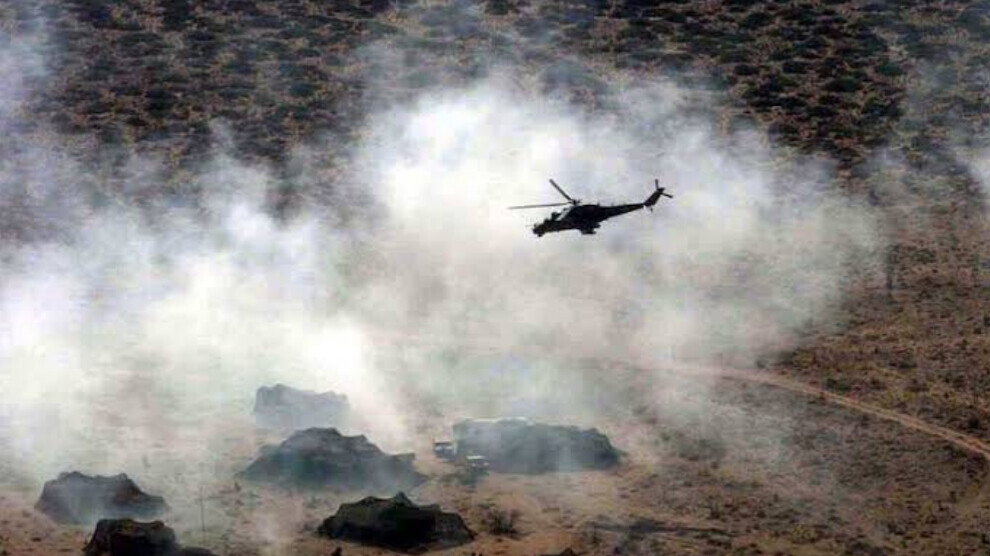A century-old chemical massacre in Kurdistan
War crimes are still committed in Kurdistan which has been subjected to chemical attacks for a century.
War crimes are still committed in Kurdistan which has been subjected to chemical attacks for a century.

History is full of atrocities against defenceless peoples by sovereign states. The biggest threat is the use of chemical weapons in these brutal practices against peoples.
Chemical weapons which became widespread with the developments in the chemical industry are used by states against peoples.
International laws, mechanisms and organizations have been introduced to prevent the use of chemical weapons. Unfortunately, we see that chemical attacks still take place since these organizations do not fulfil their obligations. Especially when it comes to the Kurds…
CENTURY-OLD 'CHEMICAL MASSACRE' IN KURDISTAN
Kurdistan is one of the lands where atrocities carried out by states for their interests are seen permanently. Massacres with chemical weapons have been carried out since 1920 and war crimes have been committed in Kurdistan, which has been divided into four parts and subjected to the arbitrary policies of the states.
In the mid-1920s, the British forces killed 5-10 thousand Kurds with toxic gases dropped from warplanes to suppress the resistance of Şêx Mahmudê Berzencî in Sulaymaniyah. During the 1937-1938 Dersim Genocide, 70,000 people were killed by poisonous gases used by Turkey. The Saddam Regime attacked the city of Halabja, near the Iranian border in the Iraqi Kurdistan, with poisonous gases on March 16, 1988. At least five thousand people, most of whom were women and children, were killed in the attack. The attack was called the “Halabja Massacre” in recent history.
REPORTS REVEAL TURKEY’S USE OF CHEMICAL WEAPONS
A report released by the Human Rights Association (IHD) on August 26, 2011 and titled “On allegations of use of chemical and biological weapons during the armed conflict in Turkey” said that 437 PKK members were killed by chemical weapons used 46 times during the intense conflict between 1994 and 2011.
Chemical weapons injured dozens of people, including children, during the operations in the Afrin region in 2018-2019. This chemical attack was also reported in the UN reports.
It has also been revealed that the Turkish army used chemical weapons in an operation launched on April 23 2021 in the Zap, Metîna and Avaşîn regions in South Kurdistan. The chemical attack in question was reported by the British newspaper Morning, featuring images of PKK fighters who lost their lives and interviews with KCK officials.
Furthermore, according to the press centre of the People's Defence Forces (HPG), the Turkish army carried out 138 chemical attacks in the last 5 months, which caused the deaths of numerous HPG fighters. On September 4, a family was seriously harmed in a chemical attack on the village of Hirore, and the Iraq Office of the Christian Peacemaker Teams reported that the family's health problems were the outcome of the chemical attack.
It is recently reported that the Turkish army is once again using banned weapons.
Women's organizations, politicians, writers and lawyers reacted to Turkey’s use of chemical weapons, urging the Organization for the Prohibition of Chemical Weapons (OPCW) to step into action. Statements are frequently made, and protests are staged in many parts of the world against Turkey's use of banned weapons.
WHY DOES OPCW REMAIN SILENT?
The biggest obstacle to dealing with the issue of disarmament is the incapacity of international institutions. Especially when it concerns the Kurds…
The OPCW remains silent on the calls of non-governmental organizations, including the HPG and KCK to “launch an investigation” after the Turkish army has frequently resorted to chemical weapons in Kurdistan.
The relations of the OPCW, headquartered in The Hague, Netherlands, with the Turkish state were criticized following the Turkish incursion against Gri Spi (Tal Abyad) and Serêkaniyê (Ras al-Ain) in October 2019. Turkey's Ambassador to The Hague, Şaban Dişli, was reported to have donated 30,000 Euros to the OPCW at a time when statements concerning the use of chemical weapons against civilians by the Turkish army in this attack were issued.
The OPCW prohibits the use of all kinds of chemical gases, including tear gas used by the police in public events in closed areas such as military caves. However, after the Turkish army's invasion attack on Garê between February 10-13, 2021, Turkish Minister of National Defence Hulusi Akar confirmed that the Turkish army only used “tear gas”. The OPCW did not launch any investigation after Akar’s confirmation.
RELATED NEWS: